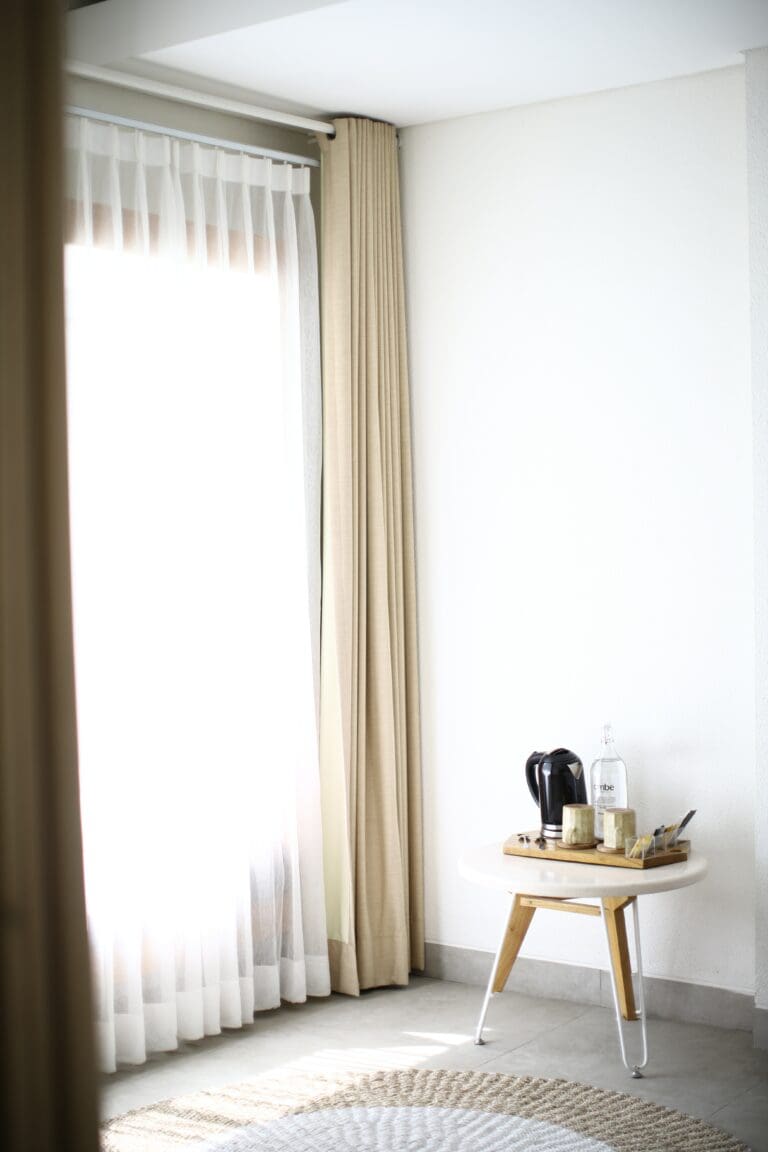As we navigate the realities of the UK’s chilly weather, it’s no secret that maintaining a warm and energy-efficient home is on the top of most people’s lists.
While investing in new windows might be in the pipeline, it might be a couple of years yet until you actually need them. So let’s explore a more immediate solution – curtains and blinds, and how they contribute to the insulation in your home.

The Practical Side: How Curtains and Blinds Boost Window Insulation
To grasp the essence of this solution, let’s delve into the practical aspects. Windows often contribute to heat loss—even the best quality triple glazed contribute a little—and that’s where curtains and blinds prove their worth. When air is trapped in between the window and curtain/blind, insulation is boosted. By selecting suitable materials and structures, you can establish an additional barrier against the cold, without the need for a substantial investment.
Material Selection:
If insulation is your top priority, opt for dense fabrics like velvet, wool, or heavy cotton. These materials function as insulators, preventing heat from escaping through the window.
Layering Logic:
If you want to strike a balance somewhere between your personal taste and insulation practicality, consider employing multiple layers. A combination of sheer and heavy curtains, or sheer curtains and thermal blinds, offers versatility. Sheer curtains allow natural light during the day, while heavier ones provide added warmth in the evening.
Blinds or Shutters for Precision:
Blinds or shutters with adjustable slats, afford more control over sunlight and heat. Close them in colder periods to retain warmth and open them on sunny days to welcome natural heat.
Exploring Options: Finding the Right Fit for Your Style and Budget
Thermal Lined Curtains:
Thermal lined curtains feature an additional insulating layer, often foam or fleece, between the decorative fabric and the lining.
Roman or Roller Blinds:
When lowered, Roman and roller blinds create a pocket of air between the window and fabric, acting as a buffer against the cold.
Your choice will depend on whether you want something that’s nearly invisible when open, or that shows a little flourish of fabric.
Some of the fabric of a Roman blind is always visible, adding a stylish look to your window when the blind is open. A great option if you’re considering blinds only, or want a very layered look. With roller blinds almost disappearing into a thin strip, they come into their own when layers with curtains.
Honeycomb (Cellular) Blinds:
The clue is in the name; honeycomb blinds are made up of two layers which are joined at regular intervals to create a honeycomb or hexagonal structure. They come in both double and triple layers and boast a cellular structure that traps air, providing an additional layer of insulation.
Mastering the Art of Curtain Management: Tips for Year-Round Comfort
Managing your curtains effectively can significantly impact your home’s interior temperature. Here’s a handy guide on when to open and close your curtains throughout the seasons:
Winter Wisdom:
Sunny Winter Days:
Open during the Day: Allow sunlight to naturally warm your home. Open curtains on south-facing windows to maximise exposure to the sun’s warmth.
Close at Night: Not simply for your privacy. As the temperature drops in the evening, close curtains to trap the heat gained during the day.
Overcast Winter Days:
Keep Curtains Closed: On cloudy days, keep curtains closed to insulate your home and prevent heat from escaping through the windows.
Summer Strategies:
Sunny Summer Days:
Close during the Day: Shut curtains or blinds during the sunniest parts of the day to block out heat and maintain a cooler interior.
Open at Night: Take advantage of cooler evening temperatures by opening curtains to allow for natural ventilation.
Overcast Summer Days:
Keep Curtains Partially Closed: While the sun might not be blazing, partially closing curtains can still block excessive heat and maintain a comfortable indoor temperature.
Additional Curtain Management Tips:
Observe Outdoor Conditions:
This one’s a bit of a no-brainer; check the weather forecast! Adjust your curtains accordingly to make the most of natural temperature variations.
Use Light-Coloured Curtains and Blinds:
Light-coloured curtains reflect sunlight and heat, preventing excessive warming of your home during the summer. In the winter, they let more sunlight in, which can be a big bonus on those drab days.
Consider Thermal Curtains and Blinds:
In both seasons, consider investing in thermal curtains. These specialised curtains provide extra insulation, keeping your home cosy in winter and cool in summer.
Experiment and Adjust:
Pay attention to how your home responds to different curtain configurations. Experiment with open and closed positions, and adjust based on your comfort level and energy efficiency goals.
Future-Proofing Your Windows with Practicality
In consideration of future window upgrades, curtains and blinds stand out for their adaptability. Their versatility allows them to complement any window style or design now and in the future, providing a timeless addition to your home. They’ll never be a waste of money!
So, whether you’re eyeing those ideal windows or simply seeking an immediate solution, curtains and blinds serve as highly practical—and decorative—tools in your home. They not only add a touch of style but also contribute to maintaining a warm and snug living space.
In the pursuit of a well-insulated home, every pragmatic effort counts. They turn your home into a warm haven, even before new windows take centre stage. And when you’re ready to upgrade your widows, we’ll be here!

